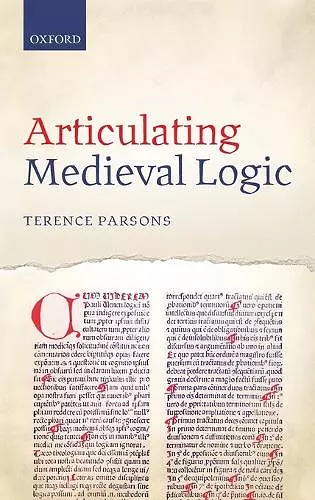Articulating Medieval Logic
Format:Hardback
Publisher:Oxford University Press
Published:27th Feb '14
Currently unavailable, and unfortunately no date known when it will be back

Terence Parsons presents a new study of the development and logical complexity of medieval logic. Basic principles of logic were used by Aristotle to prove conversion principles and reduce syllogisms. Medieval logicians expanded Aristotle's notation in several ways, such as quantifying predicate terms, as in 'No donkey is every animal', and allowing singular terms to appear in predicate position, as in 'Not every donkey is Brownie'; with the enlarged notation come additional logical principles. The resulting system of logic is able to deal with relational expressions, as in De Morgan's puzzles about heads of horses. A crucial issue is a mechanism for dealing with anaphoric pronouns, as in 'Every woman loves her mother'. Parsons illuminates the ways in which medieval logic is as rich as contemporary first-order symbolic logic, though its full potential was not envisaged at the time. Along the way, he provides a detailed exposition and examination of the theory of modes of common personal supposition, and the useful principles of logic included with it. An appendix discusses the artificial signs introduced in the fifteenth century to alter quantifier scope.
It's a book that I found admirable for the scope of its accomplishment, and a book I came away from reading with a deeper understanding of the complexities and sophistication of certain aspects of medieval logic. * Sara L. Uckelman, Philosophical Quarterly *
This is a very exciting book that makes some bold claims about the power of medieval logic ... there is enough in this rich volume to inspire future researchers to adapt medieval insights to further aspects of the rich logic of natural language. * Stephen Read, Mind *
This book is a fine contribution to the growing literature on medieval logic. It is shaped by a modern agenda: to determine how well the elaborate medieval logical problem-solving machinery can be understood in terms of modern logic and linguistics and how well the medieval system measures up with respect to its expressive potential, i.e., how many of the inferences and patterns of reasoning we are interested in can be captured using the resources of these systems and how many of the decisions about truth and validity these systems turn out can be shown to follow coherently from the basic principles of the system. . . . Parsons has succeeded in giving a unified account of a large segment of medieval logic, and one that allows an assessment of the resources of this method of doing logic * Mary Sirridge, Notre Dame Philosophical Reviews *
The invention of Linguish is a virtuoso achievement. The book maintains a high level of creative thinking throughout its length. It is a pleasure to read, partly because it is written with simple lucidity, and partly because it is beautifully laid out. There are helpful exercises along the way for the interested reader. The book will surely stimulate much further research on applying contemporary linguistic theory to the reconstruction of medieval
logic * Paul Thom, History and Philosophy of LogicPaul Thom, History and Philosophy of Logic *
ISBN: 9780199688845
Dimensions: 240mm x 162mm x 31mm
Weight: 676g
346 pages